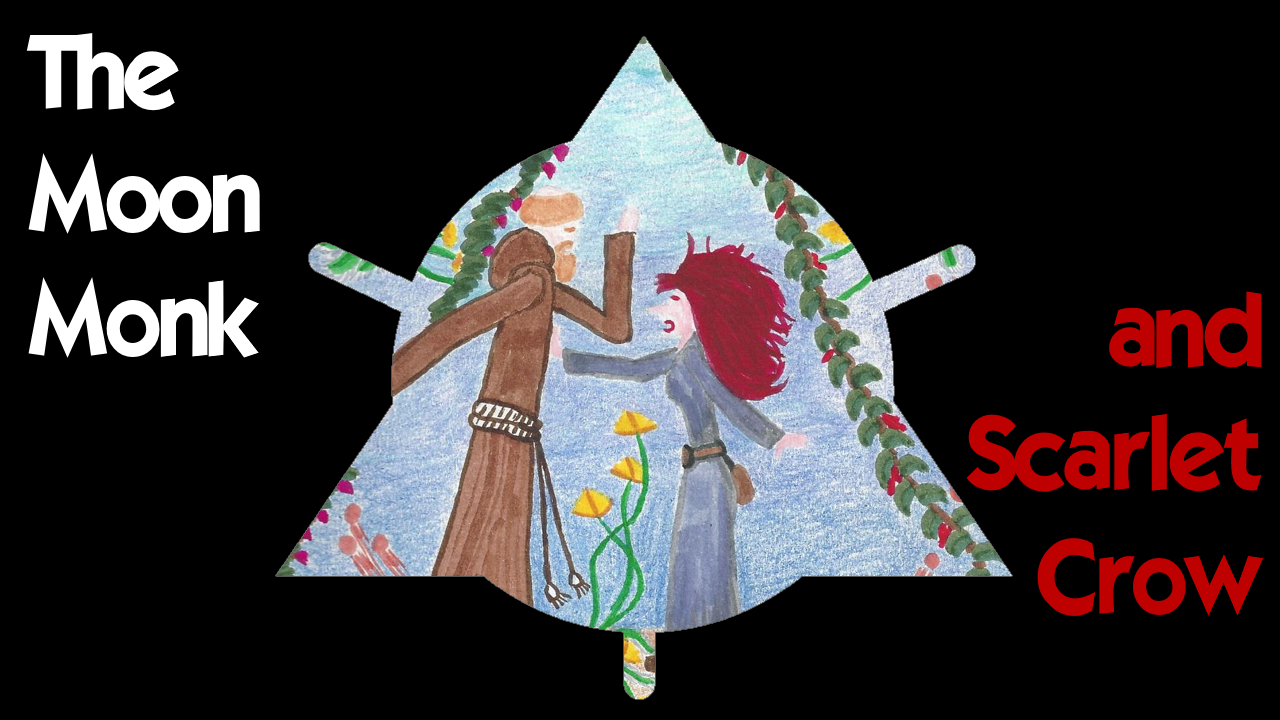Traveler, it seems that this is your first time in this town. Let me tell you our legend for that mug of ale you gave me. It is well known to the people of this village that the Moon Monk and the Scarlet Crow have their … differences. Each lived on the outskirts of town, next to the other. Tending to the flowers well into the moonlit nights or being the only red-haired lady in the village with a hoarding habit gets you nicknames. The pastor was old enough to lose all youthful features yet cling to a pale yellow hair like birch wood without a single grey. He was the kind of man that could emerge from a pig wrestling match utterly clean, immaculate. She was his neighbor, raised by witches, kidnapped by gypsies at a young age, only to be rescued by nuns, leaving for love, yet only to bury him before saying “I do.” Her red hair, large beak-like nose, and constant cawing were very distinct.
His garden was well maintained, orderly like his sermons, and beautiful like creation. In the center was a well, and from the well were lines of grapevines that formed a crucifix. Red and blue flowers lined the cross, and he divided his garden into four sections. One held wheat, other various beans, and small but sweet strawberries. Another held lilies, chrysanthemums, and peonies that would decorate the church altar. The last quarter was for root veggies like carrots and parsnips. He would rotate what he grew and where he grew every year. Even his garden borders were straight lines of elderberries and raspberries.
Her garden was a ragtag mess of strange plants she found in the woods or the odd shoots the occasional merchant would give her. Whenever someone got sick, she would go outside and rummage about the mess of knotted weeds, the cress, prickly sowthistle, red goosefoot, and whatever else caught her interest. She would rip a plant from the ground, turn it into a tincture or salve, and send the family on their way while cawing about some new plant that caught her interest. Course she would grow food like everyone else, but her garlic and horseradish had to fight for their survival.
See, stranger; this is important because they came to the village in the same wagon and squabbled even then. Their public debates would become our villages’ hot gossip for a long while. So everyone perked up and paid attention when the Moon Monk and the Scarlet Crow approached each other that fateful day.
The moon monk was the first to ask, “Are thee well?”
She stopped and said. “Fine for Friday.”
“I saw thee stumble on one of many weeds in that untamed wilderness by thy house last night.”
“The rains exposed a bulb in thy garden, and thusly stumbled into the perfect plant for night terrors. One needs such medicine when thy neighbor is haunted by boorish lines.”
“Boorish?” The moon monk asked.
“So thee don’t deny at all.” She said with satisfaction.
“Boorish?” He asked again.
“Much like this conversation is thy garden.”
At this, my mother, only a wee lass at the time stopped her chores and looked on. The women and men were passing money, making bets on the conversation.
He said with rising indignation, “Thy well in the garden center, it waters food for the congregation, flowers for the altar, baptizes babies! The four lines of grapevines make a cross, for the lord’s pierced side bled both water and blood. For this, it is the basis of the lord’s supper. Noble to grow.”
She sneered, “The common wheat of thee peasantry unfit for thou garden?”
“The weeds must be taller than expected if thou can not see thy dabbling of crossing wheat to find one that God blessed for everyone else to enjoy. It’s in the southwest corner, closest to the farmers.”
She said, “Yet thee grows what all else does. Certainly someone with more land and time than sense like thee should see the value in trying to grow something new.”
“Not again about -”
“Goosefoot! It is a perfect potherb for soups, cleans the waters, and makes a mother’s milk healthy.” She then tapped her chest and chattered on. He blush a bit at her action. Some money traded hands. He then said to himself, “At least your not talking about-”
“Sowthistle!” she exclaimed.
He slammed his hand into his face. “Can’t thou hate a prickly plant like everone else!” He shouted.
“It also is a potherb and works for the achy joints. The elders need thy tea after having those sermons. They sit for so long that the lims are numb. Only the fear of having a second sermon puts the feeling back.”
“When the holy spirit descends upon thee tongue, Nay thee to pray no. Furthermore, what good is a potherb without a potbean? For all thy cawing boasts, ye have never seen a good bean or pea. Thy hath many, green, black, white, and peas, wonderful peas that enrich everyone’s soups and stews for thy add more to the pot than thou.”
She scoffed and smirked, “Thy whole village needs stomach-cleansing garlic after thou pot beans.” At this more of the adults traded coin. The two ignored the coins being changed.
He said, “Lent and advent be hollow without good bean soup!”
“Yes, and thy lord certainly does not forbid your silly shapes.”
“Circles of altar flowers.”
“Really!”
“Thy grow lilies and lilies of the valleys, all for good days such as Easter. It takes work to make certain of fresh Sunday flowers. Some even get carried inside to survive the winter. ”
“The whole village hath noticed sharing a pew with a bulb. But thy must ask, must get an account from thee from now.”
The man paused and noticed her more serious countenance, a solid gaze in her eyes that made him step toward her. “Thy, a man of God, forever shall tend all thy flock including thee.”
“Thy call thyself a tender, doth a tending woman, of ‘erb and child, unnerve thee so?”
“One of thy most beautiful traits is a dedication to thy kin and ‘erb.”
It was her turn to begin to blush and she shook her head, as if a blush could be shaken off like dust. More coins traded hands. “Well then, why thou so perturbed by ‘erb? Thy seemingly hath all the time in the world to visit every person of thy parsonage every week. People get sick, and thou growing ‘erbs could save-”
“Thy will never grow ‘erbs as long as thee here!” He shouted at her.
She was flabbergasted and the onlooking villages shirked back in shock. Two grandfathers traded a copper piece.
“So thee problem is thy,” She whispered. “Are the twain of us to bitterly spit at each other? Thee could be a friend of sorts. Such twain of two grow the largest gardens, yet shall thee circles, and crosses never know, healing ‘erb? What is thou afraid of? Thee grow new wheat, so it can’t be trying something new. Thee grows flowers for the church. Thee grows the lord’s supper the medicine for our souls. Thy hath no answer and so must apply to thee for an answer. For if the shepherd of all thy souls refuses to grow ‘erb, does not say that growing ‘erb is wrong? Does thou accuse thy of sin?” She said the last part with a shout.
“Thy not sin to grow ‘erb even thy thorny thistle.” He said in a whisper.
“Then what?” She shouted, “What is the fear, what is thou so terrified of, so afraid-”
“Thee shall die!” he shouted. Not a coin changed hands. He breathed in and out, with angst and worry growing out of his face. “Thy fears that if the well-loved monk doth grow ‘erb none shall come to thou for tonic, tincture, or poultice. Thy already a widower, death took thee husband before child could be born. Now alone, and must work even on the sabbath, to survive. Would thou have me act as Cain, killing thy friend, thy family? Would not thy blood cry out to God for vengeance?”
For the first time, every villager saw apprehension, hesitation, on her face. She looked away and said, “Not all thy villagers would go to you.”
“But enough, enough to act as a slayer of family, for thy half been called as a supplicanter, not thy destroyer. Thy history is like thy garden, a mess. It is filled with ever manner of leafy thing, in desperate need of divine order, yet thy cannot bring thyself to say it is evil. Nay, thee garden allows one to get wild medicine without venturing into forests. Thee garden is perhaps closer to Eden than thy own.”
“Even with the thorns.”
“Every plant grew in Eden, with the tree of knowledge of good and evil along with the tree of life. Thou must make the land work for thee to survive, and thy must toss out weeds. Yet if thy must toss out thorn and thistle, If thy so easily can toss out those inconvenient weeds shall thy one day toss out members of thee flock? Little raven, thou have found a use for every plant, and must admit, such achievement is enviable.”
“And thou hath discovered an entirely new wheat! Thou feeds the congregation with the sweat from thy brow. The elderberries, carrots, and parsnips all help us. Thou is not Cain but Abel, unharmed! Thy often struggles to find what is needed and waste precious time. Across the fence, everything is so orderly and neatly done that one finds everything.”
The two and by now the entire village sat in uncomfortable silence.
He slowly said, “All one needs is a bit of cleaning up. Some squares would make walking easier so one would not trip over roots.”
“Thy never was good at ordering a garden.” She laughed at herself in shame, “It might start nice, but thy always finds more plants than hath room for.”
“What of mixed lots?”
“What?”
“It’s when one grows anything and everything but in a certain space. Thee could have all sorts of wiggly shapes, but if one kept the plants to the shapes, it would allow a trip-free path.”
“Well, a small path would let thy grow more plants.” She mused.
He then stepped towards her and grasped her hand into his own. “A path wide enough for twain would make moving things with the wheelbarrow easier.”
She blushed furiously and clasped his hand with hers, “Thy would love that.”
The villagers cheered, and the two were startled, forgetting their surroundings.
She looked at him and said, “Your countenance is redder than goosefoot.”
He said, “Thy cheeks hath raspberry blush.” He caressed her chin and said, “A good look for thee.” She blushed even harder and then hugged him. The cheering became a joyful roar from the people. Money was flung with wild abandon. Within the year, they were happily married and had a few children. Those children would later be nicknamed Nightstars, but that is a tale for another time and for another ale traveler.
[ I am an author, scientist, historian, and gamer. I can’t cultivate greatness without your generous help. ]
[ A monthly donation to my Subscribestar get you significant perks like early content: https://www.subscribestar.com/j-j-bartel ]
[ I have a book called The Lost Soul of Scholastic Study. You can purchase it here: https://www.amazon.com/LOST-SOUL-SCHOLASTIC-STUDY-PRACTICAL/dp/9692392988/ref=sr_1_1?keywords=lost+soul+of+scholastic+study&qid=1663532077&sprefix=lost+soul+of+s%2Caps%2C307&sr=8-1 ]
[ I also release content on my website: https://www.jjbartel.com ]



Very entertaining, a delight to read! I love the wonderfully descriptive details you have so skillfully woven into your story. Keep writing 🙂